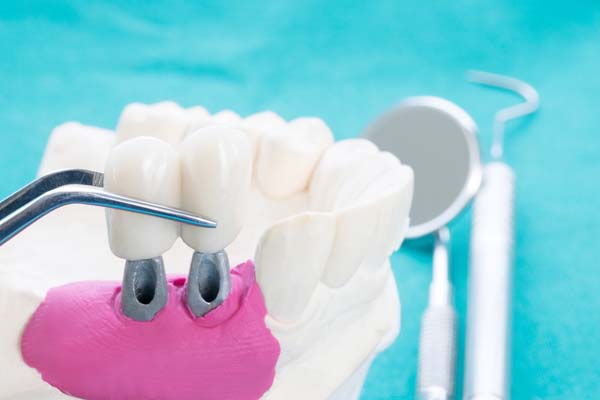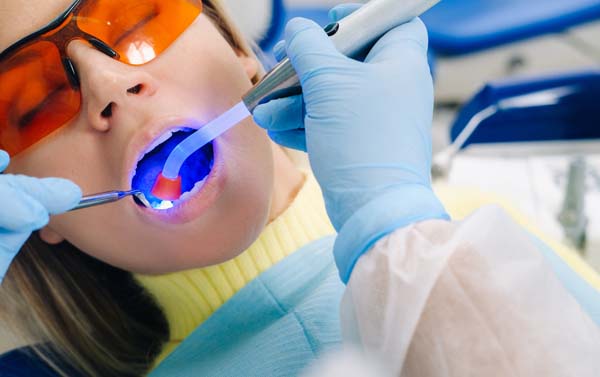How Implant Supported Dentures Can Benefit Your Oral Health

Considering implant supported dentures? This popular treatment option combines two solutions that both work to replace missing teeth. While implant-supported dentures alone solve the problem of missing teeth, they also benefit oral health in ways that may not be so obvious. Continue reading to learn more about these benefits.
Benefits of implant-supported dentures for oral health
Outlined below are a few ways that implant-supported dentures can benefit oral health. Reviewing this information can be quite helpful to individuals who are considering different tooth replacement options.
Bone stimulation and shift
The number one benefit of implant-supported dentures for oral health is the ability to stimulate the jawbone. Unlike other tooth replacement options, implant-supported dentures stimulate the bone, which helps to keep everything beneath the surface intact.
Another big problem that results from having missing teeth is a shift. The jawbone can significantly shift when there is an entire arch of teeth missing, which is often the case when considering implant-supported dentures. A shift in the jawbone may result in serious malfunction, facial structure changes, and discomfort, all of which could result in a need for extensive dental treatment.
When implant-supported dentures are placed, the implants fuse with the jawbone during osseointegration, which helps to prevent any serious changes from occurring.
Root replacement
Unlike other tooth replacement options, implant-supported dentures replace the missing roots of the teeth too, which play a big role. The roots are important as they connect to the bone, which allows for strength and mobility. With implant-supported dentures, the roots are replaced by the implants and the teeth are replaced by the dentures.
When dentures are used by themselves, there is not root replacement, which results in changes in the bone, as well as a difficult time functioning, such as eating or speaking.
Gum coverage
Another way that implant-supported dentures benefit oral health is by covering the gums. When a missing tooth exists, a gap is created, which makes the gums exposed. This exposure can result in infection and irritation, both of which may result in a need for dental treatment. Additionally, when an entire arch of teeth is missing or multiple in a row, it can be extremely difficult to eat. The gums are forced to grind foods because there are no teeth present. This can do long-term damage.
With implant-supported dentures, the gums will still be exposed for a few weeks while the implant site heals; however, long-term, they will be covered by abutments and dentures, which replace the missing teeth and cover the gap.
Get started with implant-supported dentures
When wanting to get started with implant-supported dentures, it is worth consulting with a dentist. An evaluation can be performed in order to determine whether or not implant-supported dentures are a viable option, as they are not suitable for everyone. Additionally, the dentist can ask any questions or go over any concerns that may be existing. To find out more or to get scheduled for an appointment, reach out today.
Request an appointment here: https://www.ismileteam.com or call iSmile Dental Team PC at (267) 515-6162 for an appointment in our Philadelphia office.
Check out what others are saying about our dental services on Yelp: Implant Supported Dentures in Philadelphia, PA.
Recent Posts
You likely know that a denture is not meant to be permanent. You will have to get dentures replaced from time to time over the years. Dentures typically last for 5-8 years. Once the time is up, you will need to get your dentures replaced. Learn why dentures only last for 5-8 years and what…
Dentures need to be cleaned properly frequently, just like natural teeth. This will help prevent a wide range of problems. You can keep your mouth healthy and wear your dentures for a long duration if you take proper care of them. Read on to find out what to avoid when it comes to denture care.Dentures…
Dentures can give patients a second chance at life when it comes to having a full set of teeth. Dentures allow patients to eat favorite foods, speak clearly, and be able to smile without fear of embarrassment. Most people do not think of dentures in terms of the amount of impact it is going to…
Dentures and partial dentures can repair a smile after tooth loss.If you want to restore your mouth and replace missing teeth, then dentures or partial dentures may be the option for you. Even if there are only a few gaps in a smile, replacing missing teeth can benefit various aspects of one's life. Restoring teeth…


